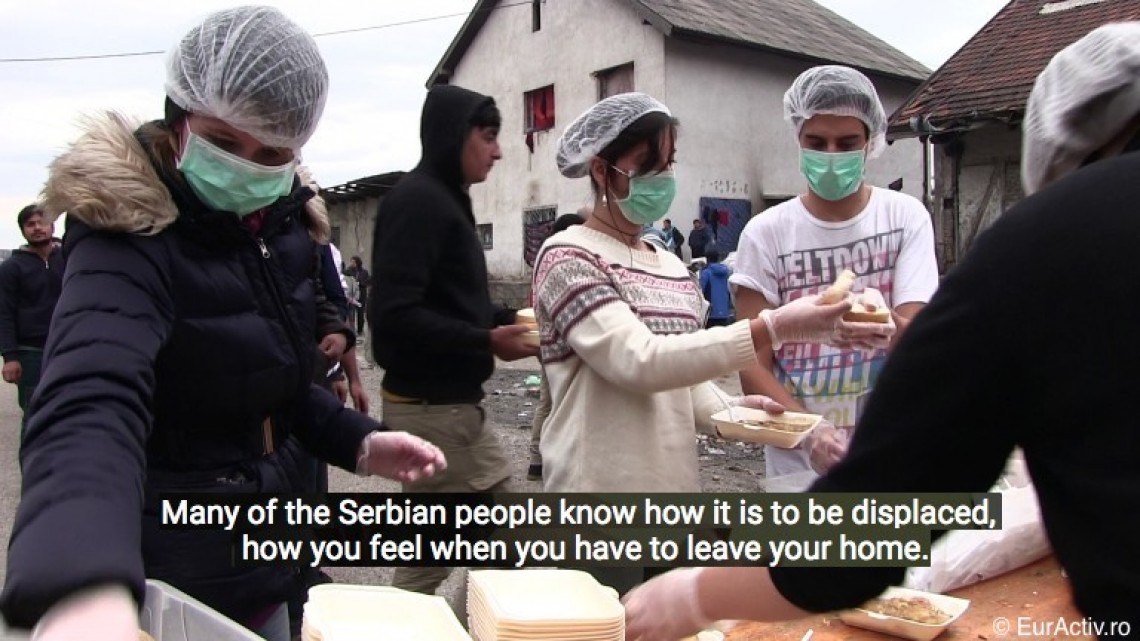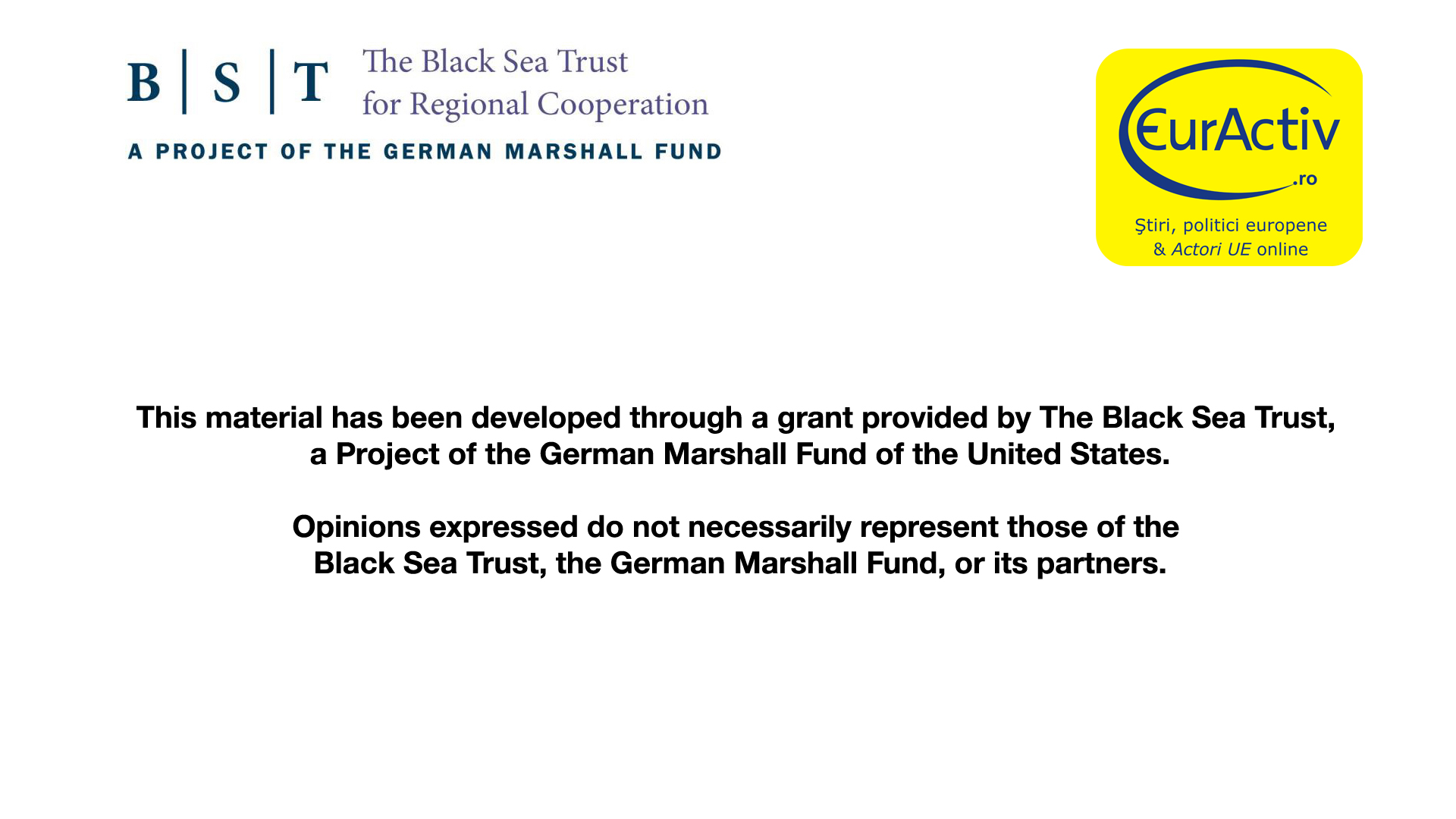Making a stop in Serbia – Part II: People helping people

As tragedies unfold, the volunteers talk about the lack of hope among the refugees and fear the potential for self-harm.
It's morning. As soon as their eyes open, people make their way from parking lots, parks, and abandoned warehouses. Hundreds of refugees swarm the train station area.
A hundred meters from the station, at the ground level of a multi-storey car park, a young Afghan man wakes up. He folds his sheets on a piece of cardboard and goes to a close-by bar to charge his phone. He greets his friends. Some of them ask us, full of hope, if we know when will the borders open.
Around the park tables there are only men. Some have come with their families, but have left their wives and children in centers where they have food and shelter. They communicate over the Internet among each other or with their families or with friends back home. They are constantly on the look-out for a way out of Belgrade – a city they would gladly exchange for Vienna or Berlin.
They have many needs and their numbers are growing. Some have tried – five, six times – to cross illegally to Hungary, but very few have actually succeeded. Those who get caught return to Belgrade beaten, full of dog bites, and without their phones, sometimes even without their clothes.
At times, if they are not careful and get tagged for carrying money with them, it is the smugglers themselves who carry them there and back and rob them of their belongings.
Tatjana, the volunteer from Save the children, continues answering our questions.
Video - The UNCOUNTRIED: Serbians feel for these people
Reporter: What is
the attitude among the local population?
"Serbian citizens have experienced conflicts and the civil war.”
Tatjana: Many of
the Serbian people know how it is to be displaced, how you feel when you have
to leave your home. Because even if they were not in this situation, maybe some
member of their families was. Serbian citizens have experienced conflicts and
the civil war, and many refugees arrived in Serbia during the 90s. So, they can
feel for these people.
"The average Serbian citizen would support and help the refugees.”
Both the Asylum Info Centre and Miksaliste (Refugee Aid Centre) are calling for help. People are bringing their clothes, so these can be distributed to the refugees.
The average Serbian citizen would support and help the refugees.
This is what we have been seeing in this transit context and we are hoping that this will also be the case if these people will stay for a longer period, or if we will have a number of them who are going to stay as asylum seekers and who will be integrated into society.
Reporter:What about the government?
"We do have some concerns, when it comes to media reports, because we have seen cases of sensational reporting, but this is still not a serious concern.”
Tatjana: The Serbian government was very supportive. From the beginning of the crisis, the Serbian authorities sent a strong message that the refugees are welcomed and that they will be supported in Serbia. So, this also helped.
Reporter: And the media?
Tatjana: We do have some concerns, when it comes to media reports, because we have seen cases of sensational reporting, but this is still not a serious concern.
"…the people who are staying in Serbia are more and more desperate and we can see that many of them are depressed and they feel like there is no future for them.”
Reporter: But, at the ground level, do you see any increase of criminal activity? What is the police attitude towards these people? Are they obeying the law and just waiting? Or are they causing any sort of trouble?
Tatjana: There were reports about criminal activities, criminal acts, assaults by smugglers, refugees, and migrants. The Serbian police has been dealing with this. These reports caused concerns in the local communities where these cases happened, but things are still under control and there are no serious concerns at the moment.
What we are concerned about is that the people who are staying in Serbia are more and more desperate and we can see that many of them are depressed and they feel like there is no future for them, they don’t know what will happen tomorrow. We are afraid that we can have cases of self-harm.
"…many people already have someone in Germany – for example – or in Sweden. (…) So, this is a strong "pull” factor for them – they want to join their families.”
Reporter: When you talk to people, do they tell you where they want to go?
Tatjana: When we talk to the people, they tell us that they want to go to Western European countries. Most of them want to go to Germany, some of them to France, or Italy, or Sweden. Some of them don’t really have an idea of where in particular they want to go, they just know that they want to reach a Western European country. Many of them - when they are thinking about a country or about their destination - actually, they want to join their families or members of their families who are already there. So, many people already have someone in Germany – for example – or in Sweden. These people left earlier or maybe they left last year. So, this is a strong "pull” factor for them – they want to join their families.
Reporter: Have you ever heard someone mentioning Romania as the final destination country?
Tatjana: Well, me personally, no, I didn't. When I talked to the people… I can't remember, can't recall anybody actually mentioning Romania.
End of Part II
Read Part I Making a stop in Serbia: The killer journey
|
Authors: Ovidiu Vanghele (interview, background research), Ioana Moldovan (camera), Dani Drăgan (video editing), Paula Căbescu (post-production related activities). |

Multi-storey car park used as a shelter
Parcare folosită ca adăpost

People sleeping in the car park
Oamenii dorm în parcare

People sleeping in the car park
Oamenii dorm în parcare

The bag of a refugee
Bagajul unui refugiat

Refugee getting his bag
Un refugiat își strânge bagajul

Men talking near the park bar
Bărbații vorbesc lângă barul din parc

Refugees charging their phones
Refugiații își încarcă telefoanele

Refugee waiting for his phone to charge. He wants to contact his family
Un refugiat așteaptă telefonul să se încarce. Vrea să-și contacteze familia.

Refugee Aid Miksaliste
Centrul de ajutor pentru refugiați Miksaliste

Tatjana, Save the Children, shows us the center
Tatjana, Salvați Copiii, ne arată centrul

Inside the center
În interiorul centrului de ajutor pentru refugiați

Volunteers distributing food
Voluntari distribuie mâncare

Volunteers distributing food
Voluntari distribuie mâncare
|
See the section THE UNCOUNTRIED See the stories on Serbia VIDEO / INTERVIU O oprire în Serbia – Partea I: Călătoria spre viață care, uneori, ucide VIDEO / INTERVIU O oprire în Serbia – Partea II: Oameni care se ajută (En.) Making a stop in Serbia – Part I: The killer journey See the stories on Romania See the stories on Bulgaria VIDEO-INTERVIU (II): Am plecat din Siria, m-am stabilit în Bulgaria. „Acum, sunt profesor în Sofia”
|
Our project
The route used by refugees coming from the Middle East to Europe has not closed after the migration peak of 2015. The only thing that has happened is that the number of people reaching the wealthier and opportunity-filled West has dropped, as the route has gotten significantly harder than it was during the more favorable context of a few years back.
Some countries have effectively closed their borders, forcing the refugees to go around or simply blocking thousands of people from continuing their journey towards the European dream.
Assisting the refugees continues to represent a problem for the poor states in the region that lack the necessary resources to shelter them.These countries continue to be confronted with thousands of vulnerable people to whom they have to ensure minimum living conditions.
EurActiv Romania has documented with the financial assistance of the German Marshall Fund the hardships and tragedies of migrants and refugees coming to Europe from the Middle East. We have taken a closer look at the challenges they face, but also at the opportunities that they can access in order to rebuild their lives, at the horrifying stories of their death escaping journeys, but also at extraordinary examples of compassion, at misleading prejudice and misunderstanding of day-to-day realities, and also at exemplary cases of integration and community service.






Comentarii